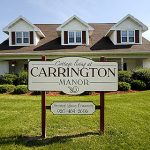It may sound like a dull topic, but working with well-conceived and thoughtfully structured Lease Compliance or Management Compliance documents in senior housing ownership can be the key to happily-ever-after endings for participants in senior housing /healthcare partnership arrangements.
“This especially applies when property owners retain third-party management to operate senior housing businesses,” says Cambridge Realty Capital Companies Senior Vice President for originations, operations, and asset management Brent Holman-Gomez.
Cambridge is one of the nation’s leading senior housing/healthcare lenders and acquires properties through its Cambridge Investment and Finance Co. subsidiary. The company’s investment strategy includes direct property acquisitions, joint ventures, and sale/leaseback transactions.
“Developing a system that enables information to flow seamlessly between ownership and management is important in every industry and imperative in the senior housing/healthcare industry when the shared goal is to maximize profits and minimize risks,” he said.
Mr. Holman-Gomez explains that Lease Compliance or Management Compliance documents describe precisely how operators will provide the information owners need to manage asset risks. Included on the list are such things as financial and occupancy reporting, clinical information sharing, the documentation of insurance, property alterations and licensure.
“It’s the ownership asset manager’s job to establish the basic reporting requirements. This must happen before the softer aspects of the relationship can develop,” he said.
Mr. Holman-Gomez notes that Cambridge’s principals have a long history of involvement in the acquisition, development and ownership of commercial real estate dating to the 1970s. The company utilizes the services of a third-party accounting firm to effectively serve as comptroller and oversee the numerous client contract compliance requirements involved.
“The job is to establish what and when information is needed and how (in what standardized format) it should be provided. The details are thoroughly spelled out in the operator’s lease or management contract,” he noted.
He says the third-party accounting firm identifies specific dates and timeframes for reports to be provided; for example, year-end financials must be reported within 90 days of year-end, and state clinical citations must be reported within five business days. A tickler file is maintained to make certain everything remains on schedule.
Effectively, the third-party consulting firm provides a systematic, objective method of collecting information in a format that works for both the owner and operator. The arrangement assures that the same process is consistently followed on a monthly basis. And it offers a neutral buffer or separation between owner and operator that creates the possibility for added scrutiny; for example, when exceptions are requested by operators.
“Once the basic, legally required information established in the lease or management contract is flowing, the relationship between owner and operator can blossom. An informed owner will be aware of the key characteristics of their property. And the operator will be in full compliance with their legal requirements and in position to develop the partnership based on understanding and respect.”




